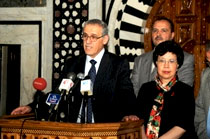 Dr Ala Alwan, WHO Regional Director for the Eastern Mediterranean, Dr Margaret Chan, WHO Director General, and Dr Abdellatif Mekki, Minister of Public Health of Tunisia, at the conference – Value for money, sustainability and accountability in the health sectorIn Africa, more and more countries are being branded as middle-income countries and there is growing recognition by policy-makers that improved health is a prerequisite for sustainable development. They recognize that the health sector, when properly managed, is an important source of economic growth.
Dr Ala Alwan, WHO Regional Director for the Eastern Mediterranean, Dr Margaret Chan, WHO Director General, and Dr Abdellatif Mekki, Minister of Public Health of Tunisia, at the conference – Value for money, sustainability and accountability in the health sectorIn Africa, more and more countries are being branded as middle-income countries and there is growing recognition by policy-makers that improved health is a prerequisite for sustainable development. They recognize that the health sector, when properly managed, is an important source of economic growth.
However, a decade after the adoption of the landmark Abuja Declaration in April 2001, only six countries in Africa have allocated 15% or more of their national budget to health. Even more disturbing is the fact that 11 countries are investing a mere US$ 5 or less per person per year in health, which is far less than the amount of money needed to care for those in need of health.
With stagnation prevailing almost everywhere, there are reduced external funds for health development. High-impact interventions can no longer be financed by development aid. This makes the commitment of domestic funds for health and their wise use all the more important.
In order to address this important issue, more than 300 participants, comprising ministers of health and finance and their representatives, parliamentarians, civil society organizations, private sector enterprises and representatives of bilateral and multilateral development partners and WHO senior management attended a two-day high-level ministerial conference on health financing – Value for Money, Sustainability and Accountability in the Health Sector. The conference took place in Tunis, Tunisia, from 4 to 5 July 2012.
The two-day conference was organized by member agencies of the Harmonization for Health in Africa mechanism. The conference ended with the adoption of the Tunis Declaration on Value for Money, Sustainability and Accountability in the Health Sector.
During the event that was officially opened by His Excellency Mr Hamadi Jebali, Prime Minister of Tunisia, and Dr Margeret Chan, WHO Director General, Mr Jebali called on African governments to meet their commitment to provide health for all. Dr Chan made a strong appeal to finance ministers and development partners to support the health sector. She underscored the importance of cross-sectoral collaboration to identify ways of improving efficiency, value for money and accountability. She also placed emphasis on the need for an efficient system of health information to support decision-making.
The African continent has made some progress, including improvement of some health indicators. This progress needs to be sustained. Equity, value of money, address inefficiencies, accessibility of health services are all issues that need to be seriously considered by policy-makers.
Dr Ala Alwan, WHO Regional Director for the Eastern Mediterranean, clarified that increasing financial resources for health did not necessarily mean that countries should increase their contributions for health financing, but should explore other financial resources, such as increasing taxation on tobacco, alcohol and some kinds of food.
“It doesn’t have to be spending more. It has to be spending more equitably,” said Dr Donald Kaberuka, President of the African Development Bank, who also reiterated the Bank’s commitment to providing support to countries in their health development agenda.
Related link
Good health is a pre-requisite for sustainable development, says WHO Director General


